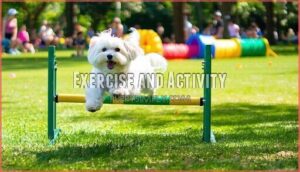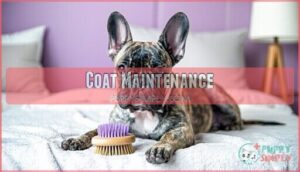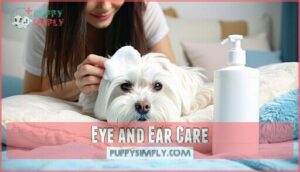This site is supported by our readers. We may earn a commission, at no cost to you, if you purchase through links.

With proper care, some even surpass this range, staying by your side for many happy years. Their life expectancy depends on factors like genetics, diet, exercise, and routine vet visits.
Common health issues include eye problems and heart conditions, but regular check-ups can catch these early. Feeding them a balanced diet and keeping them active boosts their well-being.
They’re small but big on personality, thriving in loving homes. Want your Havanese to break records? Care and attention go a long way—more on that later!
Table Of Contents
- Key Takeaways
- Havanese Lifespan Overview
- Havanese Breed History
- Diet and Nutrition
- Health and Wellness
- Exercise and Activity
- Grooming and Hygiene
- Living Conditions and Care
- Havanese Life Stages
- Maximizing Havanese Lifespan
- Frequently Asked Questions (FAQs)
- What is the most common cause of death in Havanese?
- What is the longest a Havanese has lived?
- What two breeds make a Havanese?
- Do Havanese dogs have a lot of health issues?
- What type of exercise is best for a Havanese?
- What foods should I feed my Havanese?
- How often should I groom my Havanese?
- Are Havanese predisposed to any health conditions?
- How can I tell if my Havanese is overweight?
- What are common myths about Havanese dogs lifespan?
- Conclusion
Key Takeaways
- Regular vet visits catch health issues early and play a big role in extending your Havanese’s lifespan to 14-16 years or more.
- A balanced diet and portion control help manage weight, prevent obesity, and boost your pup’s overall health.
- Daily exercise and mental stimulation keep your Havanese happy, active, and sharp throughout all life stages.
- Grooming , including brushing and dental care, prevents common health problems and keeps your dog comfortable and thriving.
Havanese Lifespan Overview
Your Havanese companion will likely be by your side for 14 to 16 years, making them one of the longer-lived small dog breeds.
Known for their longevity, Havanese dogs bring 14-16 years of love, joy, and unwavering companionship to your life.
With proper care, regular vet visits, and attention to common health issues like patellar luxation and cataracts, you’ll maximize your time with your fluffy friend.
Average Lifespan
Your Havanese companion will likely be by your side for 14 to 16 years, with proper care. Their longevity exceeds many other purebreds, with recent studies confirming their impressive life expectancy.
Given their origins, notably, the breed’s development began with dogs from Tenerife in the 1500s.
- Female Havanese typically live about a year longer than males
- A 2024 UK study found Havanese average 14.5 years, compared to 12.7 for other purebreds
- Some exceptional Havanese live well into their late teens
- Their small size (7-13 pounds) contributes to their extended lifespan
Factors Affecting Lifespan
While your Havanese can live up to 16 years, several factors influence their longevity.
Genetic predisposition plays a key role, with hereditary health issues affecting lifespan.
Environmental impacts like proper living conditions and healthcare access make a difference too.
Your lifestyle choices matter—balanced havanese diet, appropriate havanese exercise, and regular veterinary care are essential preventative measures.
Unlike some breeds, Havanese aren’t subject to many hereditary issues, making them generally robust companions with proper care.
Health Issues
While your furry companion can enjoy a long life, they may face several health challenges along the way.
Understanding these potential issues helps you take preventative measures and catch problems early.
Common havanese health problems include:
- Luxating patella (kneecap dislocation)
- Cataracts and other eye conditions
- Liver and heart disease
- Skin allergies and irritations
- Hip dysplasia
Early detection and regular veterinary care substantially impact your havanese’s lifespan and quality of life.
Securing Havanese pet insurance can provide financial security for unexpected veterinary bills.
Havanese Breed History
Looking back at the history of your Havanese companion reveals a rich tapestry of survival and resilience. This Cuban national dog hails from the Bichon family, with roots tracing to Spanish colonizers who brought these dogs to Cuba centuries ago.
A tale of resilience and charm, the Havanese journeyed from Spanish colonizers to Cuba’s cherished national companion.
The Havanese breed nearly faced extinction during the Cuban Revolution of 1959, when only 11 purebreds survived. These few dogs formed the foundation for all Havanese that exist today.
The breed standard emerged as these dogs gained popularity outside Cuba, prized for their friendly nature and adaptability. Despite their tumultuous past, Havanese have thrived to become beloved companions worldwide.
Their history includes roles as circus performers and therapy dogs. Today’s Havanese breed maintains its distinctive traits while also appearing in popular crossbreeds like Havapoo and Havashu, extending their Cuban origins into new generations.
To safeguard against unexpected health costs, consider researching Havanese pet insurance options.
Diet and Nutrition
You’ll add years to your Havanese’s life by feeding them a balanced diet that meets their unique nutritional needs.
What you put in their bowl directly affects their energy levels, coat health, and ability to fight off the common health issues that can shorten a Havanese’s lifespan, which is influenced by their nutritional needs.
Balanced Diet
A balanced diet consistently forms the foundation of your Havanese’s longevity. You’ll need to provide high-quality dog food appropriate for small breeds that contains protein, carbohydrates, fats, vitamins, and minerals.
Portion control is essential for weight management, as obesity can shorten your dog’s lifespan. Watch for food allergies by monitoring reactions after meals.
Consider specialized Havanese food to cater to their specific needs. Some Havanese may benefit from supplements, but always consult your vet first to ensure the best diet for your pet.
Nutritional Needs
Your tiny Havanese has specific nutritional needs that directly impact their 14-16 year lifespan. To maintain ideal weight and support havanese health, focus on these essential nutrients:
- High-quality protein (25-30%) for muscle maintenance
- Moderate healthy fats (12-16%) for coat health
- Limited carbohydrates to prevent weight gain
- Essential fatty acids for skin and brain function
- Appropriate calcium-phosphorus ratio for bone health
Always adjust your dog’s nutrition based on age, from puppy nutrition to senior diet requirements, to ensure you are providing the best possible care for your pet’s overall health and wellbeing.
Feeding Schedule
Now that you know what nutrients your Havanese needs, let’s set up a proper feeding schedule.
Your dog’s meal timing can impact their digestion, energy levels, and overall lifespan.
| Age Group | Feeding Frequency | Portion Size | Water Needs |
|---|---|---|---|
| Puppy (0-6 months) | 3-4 times daily | Small, frequent | Check bowl hourly |
| Puppy (6-12 months) | 2-3 times daily | Moderate | Always available |
| Adult (1-7 years) | 2 times daily | Follow package | Fresh daily |
| Senior (8+ years) | 2-3 smaller meals | Reduced calories | Encourage drinking |
Health and Wellness
You’ll need to pay close attention to your Havanese’s health to help them reach their potential 14-16 year lifespan.
Regular vet visits and watching for common issues like patella luxation, cataracts, and dental problems can add years to your furry friend’s life.
Common Health Issues
Havanese health problems can impact their lifespan. You’ll want to watch for genetic predisposition to issues like cataracts, luxating patellas, or liver concerns.
Here’s how you can help:
- Notice symptoms early, like limping or cloudy eyes.
- Use symptom management, including vet-recommended diets.
- Stay informed on emerging treatments for common diseases.
Similar to Golden Retrievers, Havanese can also experience luxating patella issues. With care, your Havanese can thrive!
Preventative Care
A stitch in time saves nine, so preventative care is key to boosting your Havanese lifespan.
Stick to vaccination schedules and prioritize parasite control.
Dental prophylaxis prevents tooth pain and related health problems.
Genetic screening helps dodge surprises tied to dog breed health.
Early socialization builds confidence, enhancing overall havanese care, which is crucial for preventing issues before they start—your pup will thank you for this proactive approach!
Regular Check-Ups
Regular check-ups are like tune-ups for your dog’s health, keeping the havanese lifespan running strong.
Early detection during health examinations helps catch issues early. Stick to vaccine schedules, don’t skip preventative screenings, and focus on parasite control.
Senior wellness visits become essential as they age. Routine veterinary care adds years, not just days, to your furry friend’s life, which is a result of early detection and proper health management.
Exercise and Activity
Keeping your Havanese active isn’t just good for their body—it’s essential for their mind, too.
Simple activities like daily walks, playful games, or a quick fetch session can make a big difference in their health and happiness.
Daily Exercise Needs
Giving your dog about 30 minutes of exercise daily, split between walks and indoor playtime, helps maintain their happiness and health.
Havanese thrive on activities that suit their energy levels, like short walks or chasing toys.
Keep sessions engaging to handle their vocal tendencies and boost their havanese life expectancy.
Consistency guarantees a balanced lifestyle and contributes to their well-being.
Mental Stimulation
Keep your dog sharp and happy with mental stimulation.
Puzzle toys and training games work wonders, tapping into the lively Havanese temperament. Novelty enrichment, like switching up activities, brings fresh fun while preventing boredom busters.
Incorporate dog mental stimulation into daily havanese care routines to release their smarts. Social interaction during havanese training also keeps their curious minds engaged and keen to learn!
Using treats and praise, you can utilize positive reinforcement methods to shape behavior.
Playtime and Socialization
Playing with your Havanese goes beyond fetch—it’s their lifeline to a longer, happier life.
Socialization strengthens their temperament and keeps them sharp at any age. Include activities like interactive toys, training games, or setting up puppy classes.
- Boost happiness: Organize playdates for socialization benefits.
- Prevent boredom: Provide interactive toys daily.
- Enhance obedience: Use training games for mental stimulation.
Grooming and Hygiene
Keeping your Havanese clean and well-groomed isn’t just about looks—it’s essential for their health and comfort.
Regular grooming reduces mats, prevents infections, and keeps them feeling their best.
Coat Maintenance
Your Havanese’s hypoallergenic coat deserves daily attention to stay silky and healthy.
Practice gentle brushing techniques with a soft comb to prevent tangles and matting. Use quality coat products for shine and manageability.
Schedule professional grooming every 4-6 weeks for a polished look. A well-maintained coat boosts comfort and reduces shedding, keeping your furry friend happy.
To maintain their beautiful coats, consider using a specialized grooming comb for the best results.
| Task | Frequency | Tools/Products Needed | Notes |
|---|---|---|---|
| Brushing | Daily | Soft comb, detangling spray | Prevents tangles and promotes coat health. |
| Professional Grooming | Every 4-6 weeks | Grooming services | Keeps coat neat and reduces matting time. |
| Bathing | As needed | Mild dog shampoo | Avoid too frequent baths; dries out coat. |
| Coat Inspection | Weekly | Your hands and eyes | Catch early signs of skin issues. |
Dental Care
A shiny coat’s great, but don’t forget about those pearly whites!
Regular teeth cleaning keeps tartar control in check and prevents gum disease.
Bad breath isn’t just smelly—it’s a sign of dental issues that can affect the Havanese lifespan.
Start with puppy teeth and make dog dental care part of your routine.
Dog checkups catch hidden problems early, which is crucial for preventing gum disease.
Eye and Ear Care
Regular eye care and ear cleaning can save your pup a lot of discomfort.
Gently wipe away tear staining daily and inspect for redness or eye conditions. For ears, use cleaning solutions weekly to prevent ear infections.
Veterinary exams help catch problems early. These preventative measures, paired with regular eye examinations, keep your Havanese happy, healthy, and living longer.
Living Conditions and Care
Your Havanese thrives in a loving, structured environment where they feel safe and cared for.
By ensuring proper training, regular grooming, and plenty of social interaction, you can help them live a happy, healthy life.
Suitable Living Environments
Your furry friend thrives in cozy spaces.
Their small size makes them perfect for apartment living, as long as they get daily walks.
They’re great with families, kids, and even other pets.
Keep their living area calm—loud noise can stress them.
Mild climates suit them best, while havanese senior care benefits from a safe, comfortable setup for their restful years.
Socialization and Training
Early socialization is key for the Havanese breed to thrive.
Consistent training using positive reinforcement builds confidence and curbs behaviors like excessive barking in this vocal breed.
Addressing separation anxiety early reassures them during alone time.
Patience and clear dog training tips create well-mannered companions.
With consistent havanese training, you’ll guide their playful, intelligent nature into delightful dog behavior.
Ownership Costs
Starting with the initial puppy cost, Havanese ownership isn’t cheap—prices range from $1,000 to $3,000.
Monthly expenses, including food, grooming costs, and insurance options, can hit $130-$252.
Don’t forget ongoing costs like training or hidden fees for health issues.
With a lifetime cost nearing $27,000, budgeting wisely guarantees your dog’s needs are always met, keeping them happy and healthy.
Havanese Life Stages
Your Havanese’s life is marked by three main stages: puppy, adult, and senior.
Understanding what to expect at each stage helps you provide the best care, ensuring they stay happy and healthy throughout their years.
Puppy Stage
Bringing home your Havanese puppy is an exciting start! Focus on early socialization to build confidence and healthy habits.
Lay strong training foundations—potty training and basic commands are key during growth spurts.
Handle teething troubles patiently, offering safe chew toys.
Puppy vaccinations protect your pup during this dog breed age. Nurture these early years for lifelong benefits!
Adult Stage
As your Havanese hits adulthood, you’ll notice behavioral changes and adult milestones shaping their personality.
Training reinforcement becomes key to maintaining manners and reducing anxiety.
Adjust their activity levels to match their energy, balancing play and rest.
Fine-tune dietary adjustments for their age, keeping them healthy and happy.
Dog adulthood is the prime stage for strengthening their bond and ensuring their lifespan thrives.
Senior Stage
As your Havanese enters their golden years, their needs change.
Age-related changes like graying fur, mobility issues, and reduced energy are common.
Here’s how to support their senior care:
- Provide a senior diet formulated for easy digestion.
- Address mobility issues with joint supplements and gentle activities.
- Schedule frequent vet check-ups to monitor their overall health and extend their lifespan.
Maximizing Havanese Lifespan
You can help your Havanese live a long, healthy life with proper care and smart habits.
Regular vet visits, a balanced lifestyle, and a little extra attention go a long way in keeping your furry friend happy and thriving.
Proper Care and Attention
Showing love and affection daily keeps your Havanese happy and mentally sharp.
Social interaction strengthens their confidence, while early socialization builds lifelong manners.
Prioritize training consistency to reduce stress and enhance their quality of life.
Cater activities to the dog’s age—playful pups need stimulation, while seniors thrive with gentle care.
Balanced dog care maximizes their lifespan.
Regular Veterinary Visits
Scheduling regular veterinary visits is key to your Havanese’s lifespan. It guarantees early detection of health issues and keeps them thriving with preventative measures.
Here’s what to focus on:
- Stick to vaccination schedules and parasite control.
- Schedule annual exams to support their dog health and age.
- Prioritize senior care as your Havanese ages gracefully.
Healthy Habits and Lifestyle
A balanced diet, joint protection, and proper weight management are key for your Havanese’s long life.
Pair these with mental wellbeing, healthy activity levels, and quality sleep.
Social interaction and training impact their happiness as they age.
Here’s a quick checklist:
| Habit | Benefit | Focus Area |
|---|---|---|
| Weight management | Reduces joint stress | Balanced diet |
| Daily activity | Boosts energy levels | Havanese senior care |
| Relaxation | Improves sleep quality | Mental wellbeing |
Weight management, daily activity, and relaxation are all crucial for a balanced diet and overall health.
Proper care, including quality sleep, is vital for your Havanese’s long and happy life.
Frequently Asked Questions (FAQs)
What is the most common cause of death in Havanese?
Life’s little wrinkles often come with aging, and for Havanese, the most common cause of passing is heart disease.
Regular vet visits and early care can help guarantee a longer, healthier, tail-wagging journey.
What is the longest a Havanese has lived?
The oldest recorded Havanese lived just over 18 years, though very rare.
With proper care, including regular check-ups, good nutrition, and love, your Havanese might enjoy a long, healthy life close to this milestone.
What two breeds make a Havanese?
Ever wonder where the lovable Havanese comes from?
It’s a blend of the now-extinct Blanquito de la Habana and other small Bichon-type dogs.
Together, they created this adorable, friendly, and intelligent breed!
Do Havanese dogs have a lot of health issues?
Havanese dogs are generally healthy, but like all breeds, they’re prone to issues like cataracts, patellar luxation, and allergies.
Regular vet visits, proper care, and grooming help you manage these concerns and keep them thriving, which is a key part of maintaining their overall health and preventing issues like allergies.
What type of exercise is best for a Havanese?
Picture your Havanese bounding joyfully in a small park.
Daily walks, playful indoor games, and short sessions of fetch or tug-of-war keep them happy.
Avoid overexertion, but consistent activity suits their lively, affectionate nature.
What foods should I feed my Havanese?
Feed your Havanese high-quality dog food suited for small breeds, with lean proteins, healthy fats, and whole grains.
Include occasional fruits or veggies like carrots and blueberries.
Stick to regular portions to avoid overfeeding.
How often should I groom my Havanese?
Think of grooming as your Havanese’s love language.
Daily brushing helps prevent tangles in their silky coat, while professional trims every 4-6 weeks keep them fresh.
Regular care avoids health issues and guarantees they shine brilliantly.
Are Havanese predisposed to any health conditions?
Your Havanese might face issues like cataracts, luxating patella, allergies, or liver disease.
Regular vet visits, good grooming, and a balanced diet can help prevent problems.
They’re generally healthy but need care to thrive!
How can I tell if my Havanese is overweight?
Your furry friend’s waist disappearing faster than a donut in a breakroom?
Check their ribs; you should feel them without pressing hard.
If they’re hard to find, it’s time to adjust their diet and exercise.
What are common myths about Havanese dogs lifespan?
A common myth is Havanese dogs don’t live long, but they actually have a lifespan of 14–16 years.
Others think their health issues are overwhelming, yet proper care and regular vet visits keep them thriving.
Conclusion
Imagine your Havanese thriving well into their golden years—healthy, happy, and full of life.
By focusing on factors like a balanced diet, regular vet visits, proper exercise, and a loving environment, you can help maximize your Havanese’s lifespan.
Small steps, like maintaining their hygiene and meeting their unique needs, add up quickly.
While 14 to 16 years is the average Havanese lifespan, attentive care can help your fluffy companion exceed expectations and stay by your side for years to come.



















